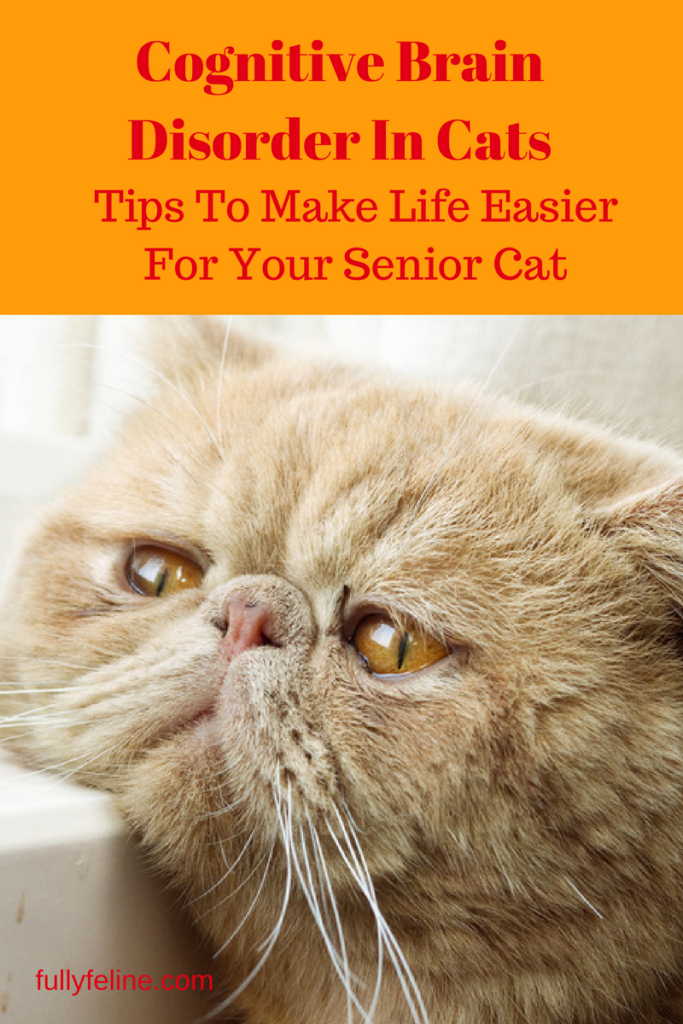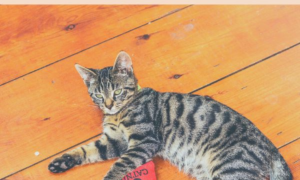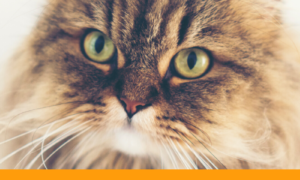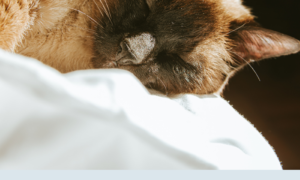Aging is a natural process among humans and feline friends alike. If you have a cat that is getting on in years, and you’ve noticed some changes in behavior, he may be suffering from cognitive brain disorder, a condition similar to Alzheimer’s Disease that impacts humans.
By 15 years of age, cats may begin to exhibit signs of cognitive brain disorder, according to the American Association of Feline Practitioners. This can impact not only your cat, but you and your family members, as well.
Disclaimer: This post contains affiliate links. We receive a small commission on goods purchased via these links, at no additional cost to you.
Symptoms Of Cognitive Brain Disorder
Here are a few signs of cognitive brain disorder in senior cats:
- Lack of appetite
- Taking potty breaks outside of the litter box
- Less interaction with humans and other pets
- Decreased problem solving skills
- Less overall awareness of surroundings
- Disrupted sleep-awake cycles
- Loud crying, primarily during the nighttime hours
How You Can Help
So, how do you help your cat through this time of his life? It is important to provide the right nutrition and mental stimulation. Choose foods and specially formulated treats that are high in antioxidants and omega fatty acids. This aids in cognitive function. Incorporate a maze or puzzle ball into feeding time.
Keep Light On
When it is time for nighttime slumber, keep your cat’s sleeping area quiet and safe. As his vision may be declining, keep a light or night-light turned on, especially since his sleep-awake patterns are changing and he might be prone to wandering around at night.
Aids To Help Navigate Around The House
Make sure you apply non-skid surfaces in your home and add ramps or steps to assist your aging cat getting to places without having to jump. You may even want to add more litter boxes or get a bigger one, as your cat may experience more waste elimination at this time in his life.
Aging is not a negative process, it’s natural. Just know that your cat does not have to go through it alone, and with your help, love and assistance, he will still be able to enjoy every single day in your loving care.
Note: This post was originally published in November 2016 and has been edited for content and format.







I had a cat that lived till the age of 16 and unfortunately had to put him down as my vet at the time (15 years ago) told me he had dementia and was just suffering, walking backwards, bumping into things etc and when he stopped eating is when we made the decision. It was hard but I knew it was the best also. R.I.P. Sasha. Thanks for this information, great post
When they stop eating, it seems to be them telling us it is time to go. Rest well, Sasha!
This is a great post, it is helpful, useful and not overwhelmingly long.
When dealing with a potentially stressful subject sometimes, people reading get worried or overwhelmed, and just walk away, but not with this. It tells you what to look for and what to do in simple terms. THANK YOU.
Thank you for the positive feedback. I appreciate it!
An informative post! Thank you this information, it comes at perfect time for me with a cat who will be turning 15 this summer. So far her health has been good but I can relate to the occasional night time meowing .
Hope this helped provide some steps that will help
What a wonderful post. Nutrition, games, and supplements are so important in our lives and our pet’s lives. You might want to check into CoQ10. In preclinical studies, it has been helping with Alzheimer’s disease. <3
Will do. My dad passed away from ALZ, so I feel I have a personal stake in this. Once research zeroes in on solutions to help, I am keeping my fingers crossed it will help animals in addition to humans
I think one of my cats may have had this when she was older. The vet thought she had a small stroke of some sort, but she was quite physically OK, so I wan’t so sure. She still did OK, but had her challenges.
Your compassion shines through in this piece – and I love that you convey the aging process is a natural one. We’ve adopted quite a few senior dogs and can testify to the power of a loving touch, a gentle hand on them (lightly) can bring a great deal of comfort!
Thanks Rebecca! I have a special place in my heart for senior pets, love them!
I have not heard of this before, but the symptoms sound very similar to our cat, Elsie, who passed away in September. I’m definitely going to bookmark this post.
Thank you! Dogs and cats, along with humans, have many of the same symptoms, unfortunately, as we age. Sorry for the loss of Elsie 🙁
Dogs have a similar senior brain disorder too. Good to know there are things you can do to help!
This is a wonderful post to keep pet parents educated. I think a lot of times, people think that when a pet begins to act differently, they attribute it to old age and it’s normal. And sometimes, it isnt and there is help. I love that you put the word out.
Thanks for that feedback. I learned a few years ago when pets start acting differently, there is something going on physically or behaviorally, and not to consider it normal. THe pet method for letting us know they need some help from us.
My feisty rescue cat Nala lived to 19.5 but suffered from kidney disease for the last few months and eventually stopped eating. She was a bit crankier and slower but she still seemed quite sharp mentally and still loved little pieces of cooked chicken. She peed on the white rug a few times to show me she had issues so we adjusted her diet and got medication. She improved for a few weeks then went downhill fast and we were on the way to the vet when she passed quietly in my older daughter’s arms.
So sorry about Nala. Like us, when they reach a certain age, think the parts just wear out. I think the feistiness helps keep them, and us, sharp. That’s why I’m staying feisty, at least that’s my story and I’m sticking to it. 🙂
Thank you for these great suggestions! It’s difficult to see our companions age and start to struggle. At the very least we can help make the progression as easy as possible.
Yes, they’re supposed to be the golden years but they seem to tarnish sometimes. Both my cat Bo and dog Jessie were seniors when I adopted them. I did all I could to make life as easy as possible for them, they deserved it.
With Chi’s living well into the 18 and higher years I have often thought about this and how would I know if it’s age or something else…. great post.
Thanks!
What a great posting. My oldest cat, Tosca, died due to natural cause at the exceptional age of 23, but I lost my Mr Pluuster due to hartfailure at the age of 14. Since last november I took in a senior rescue, Mr Garfield, age 12. He bonded very good with rescue Mr Rascall (2) and the Boss of both rescue boys, my proud Maine Coon Lady Mss Mara (5).
We think our cat is 16 and so far he doesn’t have these symptoms. I think it is great that there are so many ways to make life easier for someone who is experiencing cognitive brain disorder. I learned a fair amount about Dementia in humans with my stepmother, it is interesting to see how the symptoms parallel in other species.
Thank you for sharing this information. I’ve read about the loud meowing at night with senior cats with some of my cat blogging friends